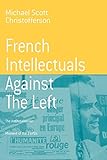French Intellectuals Against the Left : The Antitotalitarian Moment of the 1970s / Michael Scott Christofferson.
Material type: TextSeries: Berghahn Monographs in French Studies ; 2Publisher: New York ; Oxford : Berghahn Books, [2004]Copyright date: ©2004Description: 1 online resource (306 p.)Content type:
TextSeries: Berghahn Monographs in French Studies ; 2Publisher: New York ; Oxford : Berghahn Books, [2004]Copyright date: ©2004Description: 1 online resource (306 p.)Content type: - 9781571814272
- 9781782389743
- 320.53094409047 21/eng/20231120
- online - DeGruyter
| Item type | Current library | Call number | URL | Status | Notes | Barcode | |
|---|---|---|---|---|---|---|---|
 eBook
eBook
|
Biblioteca "Angelicum" Pont. Univ. S.Tommaso d'Aquino Nuvola online | online - DeGruyter (Browse shelf(Opens below)) | Online access | Not for loan (Accesso limitato) | Accesso per gli utenti autorizzati / Access for authorized users | (dgr)9781782389743 |
Browsing Biblioteca "Angelicum" Pont. Univ. S.Tommaso d'Aquino shelves, Shelving location: Nuvola online Close shelf browser (Hides shelf browser)

|

|

|

|

|

|

|
||
| online - DeGruyter The Ambivalent Alliance : Konrad Adenauer, the CDU/CSU, and the West, 1949-1966 / | online - DeGruyter German Public Policy and Federalism : Current Debates on Political, Legal, and Social Issues / | online - DeGruyter Sartre Against Stalinism / | online - DeGruyter French Intellectuals Against the Left : The Antitotalitarian Moment of the 1970s / | online - DeGruyter Business and Industry in Nazi Germany / | online - DeGruyter The Jews and the Expansion of Europe to the West, 1450-1800 / | online - DeGruyter Exiles From European Revolutions : Refugees in Mid-Victorian England / |
Frontmatter -- CONTENTS -- ACKNOWLEDGEMENTS -- ABBREVIATIONS -- INTRODUCTION French Antitotalitarianism in Comparative Perspective -- Chapter 1 FROM FELLOW-TRAVELING TO REVISIONISM The Fate of the Revolutionary Project, 1944-1974 -- Chapter 2 THE GULAG AS A METAPHOR The Politics of Reactions to Solzhenitsyn and The Gulag Archipelago -- Chapter 3 INTELLECTUALS AND THE POLITICS OF THE UNION OF THE LEFT The Birth of Antitotalitarianism -- Chapter 4 DISSIDENCE CELEBRATED Intellectuals and Repression in Eastern Europe -- Chapter 5 ANTITOTALITARIANISM TRIUMPHANT The New Philosophers and Their Interlocutors -- Chapter 6 ANTITOTALITARIANISM AGAINST THE REVOLUTIONARY TRADITION François Furet’s Revisionist History of the French Revolution -- EPILOGUE AND CONCLUSION -- SELECTED BIBLIOGRAPHY OF SECONDARY SOURCES -- INDEX
restricted access online access with authorization star
http://purl.org/coar/access_right/c_16ec
In the latter half of the 1970s, the French intellectual Left denounced communism, Marxism, and revolutionary politics through a critique of left-wing totalitarianism that paved the way for today's postmodern, liberal, and moderate republican political options. Contrary to the dominant understanding of the critique of totalitarianism as an abrupt rupture induced by Aleksandr Solzhenitsyn's The Gulag Archipelago, Christofferson argues that French anti-totalitarianism was the culmination of direct-democratic critiques of communism and revisions of the revolutionary project after 1956. The author's focus on the direct-democratic politics of French intellectuals offers an important alternative to recent histories that seek to explain the course of French intellectual politics by France's apparent lack of a liberal tradition.
Mode of access: Internet via World Wide Web.
In English.
Description based on online resource; title from PDF title page (publisher's Web site, viewed 25. Jun 2024)


